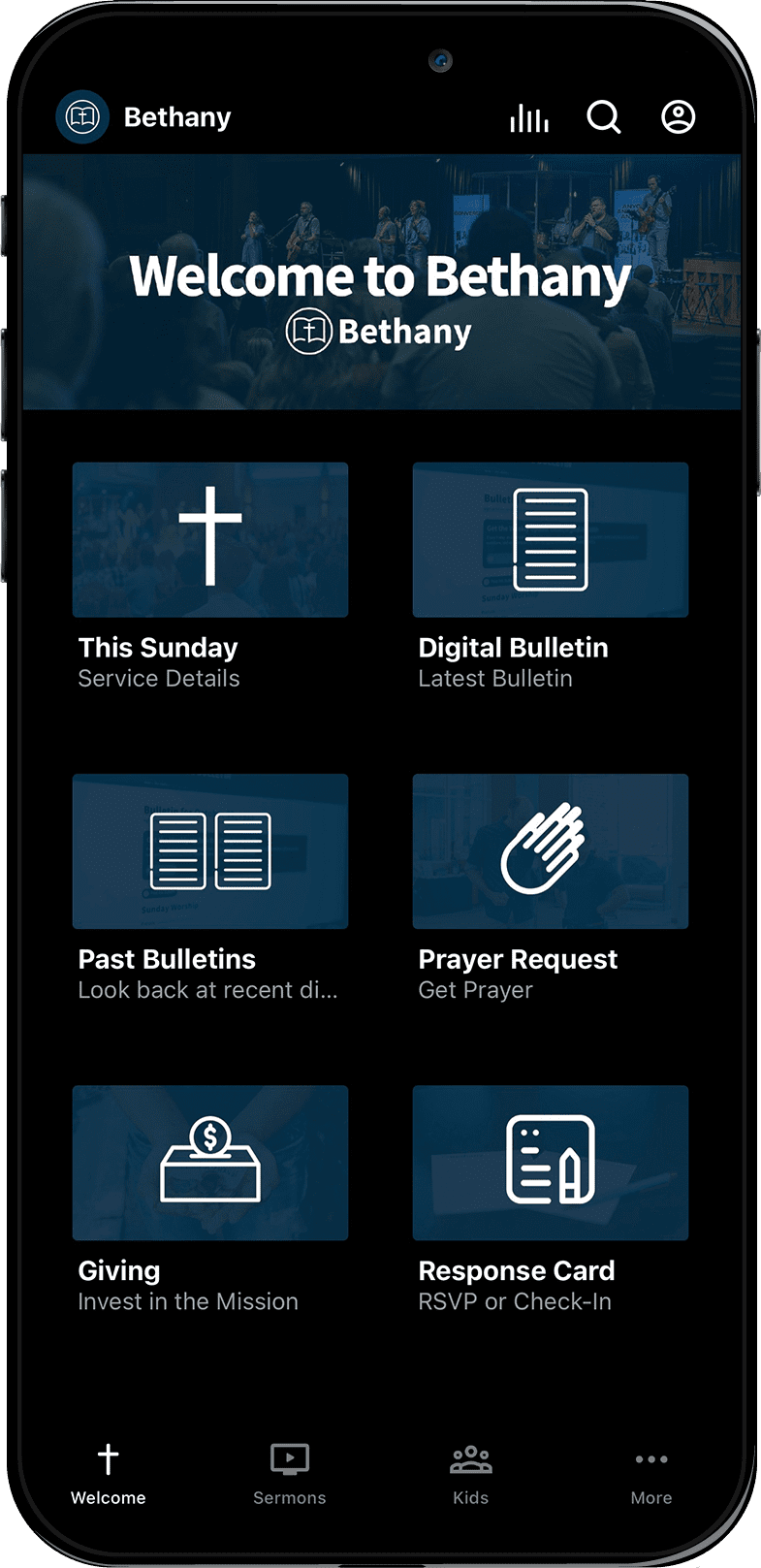In This Series
Acknowledge Him!
Acts 11:1-18 (ESV)
June 20, 2021
Dr. Ritch Boerckel
In all seasons, the church is so central to God’s working. We’re going to learn more about that again today as we look at Acts chapter 11. Please turn there. The church is central not just individually, coming to the Lord, but how central the church is to the program of God in this world. One of the ways that the church is central is through our encouragement to each other. We’re going to read Acts 11:1-18.
We’ve been in this series in Acts and we’re coming to the end of it. We’re going next to have an expositional series on the doctrine of the Holy Spirit. We believe of our great need for the Holy Spirit to work in our lives and in our church. So that’s where we’re going next. But we’re on the last trek in the Book of Acts. We’ll kind of finish at the halfway point. But this is the point where God is extending the Gospel not only in Jerusalem and Judea and Samaria, but now it’s going to the uttermost parts of the world. That’s the importance of chapters 10 and 11. The Gentile church is getting established.
1 Now the apostles and the brothers who were throughout Judea heard that the Gentiles also had received the word of God. 2 So when Peter went up to Jerusalem, the circumcision party criticized him, saying, 3 “You went to uncircumcised men and ate with them.” 4 But Peter began and explained it to them in order: 5 “I was in the city of Joppa praying, and in a trance I saw a vision, something like a great sheet descending, being let down from heaven by its four corners, and it came down to me. 6 Looking at it closely, I observed animals and beasts of prey and reptiles and birds of the air. 7 And I heard a voice saying to me, ‘Rise, Peter; kill and eat.’ 8 But I said, ‘By no means, Lord; for nothing common or unclean has ever entered my mouth.’ 9 But the voice answered a second time from heaven, ‘What God has made clean, do not call common.’ 10 This happened three times, and all was drawn up again into heaven. 11 And behold, at that very moment three men arrived at the house in which we were, sent to me from Caesarea. 12 And the Spirit told me to go with them, making no distinction. These six brothers also accompanied me, and we entered the man’s house. 13 And he told us how he had seen the angel stand in his house and say, ‘Send to Joppa and bring Simon who is called Peter; 14 he will declare to you a message by which you will be saved, you and all your household.’
They haven’t been saved yet. They needed the message.
15 As I began to speak, the Holy Spirit fell on them just as on us at the beginning. 16 And I remembered the word of the Lord, how he said, ‘John baptized with water, but you will be baptized with the Holy Spirit.’ 17 If then God gave the same gift to them as he gave to us when we believed in the Lord Jesus Christ, who was I that I could stand in God’s way?” 18 When they heard these things they fell silent. And they glorified God, saying, “Then to the Gentiles also God has granted repentance that leads to life.”
May God encourage us through His Word, today!
More and more often I find myself asking friends the question, “Have I told you the story about…?” There are some stories and jokes that I love to tell more than once, but I don’t like to repeat them to the same people. Of course, my wife and children have heard them over and over. They are polite as they hear a joke for the 100th time, but I want to spare most of you that painful experience. What would you think if we had dinner together and over the course of a couple hours I told you the same story, not just once, not just twice, but three times? Each time I told it, I would share it with the same gusto and enthusiasm as I did when I first shared it. Well, I think you would likely be concerned for my health. Who intentionally tells a story three times in a short space of time? Well, the answer to that question is a man by the name of Dr. Luke. Here in Acts 11, Dr. Luke repeats the same story for the third time. He repeats this story three times, not because he has forgotten that he told it in the first place. He repeats this story under the guidance of the Holy Spirit because God wants us to get a really, really important message.
The message God teaches us through this thrice-told story focuses our attention upon the nature of God’s church. This story reminds us that the church is God’s possession. He created her. He directs her. The church is not ours to shape like playdough to our whims. The church exists for God’s pleasure and not for our preferences. God invites people who are very different to be part of His one family. He loves His diverse people; people who He loves and receives and accepts without distinction, without rank, and without partiality. God’s one requirement for entrance into His church, into His family, is that we listen to and follow Jesus as our Savior and our Lord.
The main idea we’re going to trace today is that the church is God’s precious possession. God’s central work in our world is the building of His church into a holy Temple, into a dwelling place of God. If we are to be part of God’s work in this world, His church must be central to our lives. The church is God’s means to make Jesus preeminent in everything. Listen to what God says about Jesus in Colossians chapter 1.
Colossians 1:17-18 And he is before all things, and in him all things hold together. And he is the head of the body, the church. He is the beginning, the firstborn from the dead, that in everything he might be preeminent.
As the head of the church, Jesus has authority to steer the church in directions that make us personally uncomfortable. Jesus is right to dismiss our preferences in favor of His own will. The key question to ask when we think about our church is not, “What am I getting out of it?” Instead, we settle our hearts upon the question, “How can we make Jesus central, preeminent in everything we do?” We do not gather together to have our personal needs met. We gather together to worship Jesus. The wonder of God is that when Jesus is preeminent in the church family, He meets our personal needs. It’s not through chasing after the fulfillment of our personal needs that we have them met. It’s through chasing after the preeminence of Christ, who is the need-meeter for everyone. What joy!
Psalm 37:4 Delight yourself in the LORD, and he will give you the desires of your heart.
In other words, when we make God central in everything, then all of our needs are met in Christ.
Remember from our study of Acts, that the church of Jesus begins in Jerusalem among Jewish people who hear the message of the Gospel and they believe in Jesus. The church then grows from the Jews in Jerusalem, into Judea. In Acts 8, we see the church growing into Samaria, among an ethnically mixed people. All of this is stretching for this new community called the church, as it stretches out into more and more diverse people. Now in Acts 10-11, there is a seismic shift for the church. The Gentiles are now included on equal footing with the Jewish believers. This creates huge problems because up to this time, God had kept His people, the Jewish people, separate from the world, the Gentiles. In order for Gentiles to become part of God’s people, they had to become Jews in the Old Testament. We think of people like Rahab and people like Ruth as sweet examples of this. But now God is unfolding in the New Testament, the mystery of the church, the mystery that reveals how God is taking Jews and Gentiles and making them into one family. Paul would say this in
Ephesians 3:6 This mystery is that the Gentiles are fellow heirs, members of the same body, and partakers of the promise in Christ Jesus through the gospel.
So here is the question facing Peter and the apostles. Do Gentiles have to become Jews in order to be part of Jesus’ church? This question might seem trivial or perhaps silly to us living 2000 years after the creation of the church. But this question is central and of fundamental importance in the hearts and minds of these Jewish followers of Jesus. The truth is, if the early church did not get this right, the plane of the church would crash during takeoff. That’s what is at stake here as we open up our Bibles to Acts 11. From a human standpoint, the church would not have invaded the whole world if Peter and the apostles stumbled on this point, if the critics had been successful. So God works in Peter’s life to make sure that Peter gets God’s message right.
This message from God was hard for Peter. Remember what Peter said when he first saw the vision of the blanket filled with unclean animals. The angel told him to rise and eat. And what did Peter say?
Acts 10:14 But Peter said, “By no means, Lord; for I have never eaten anything that is common or unclean.”
This vision happened three times. And as he is having the vision from the angel, Peter hears a knock at his front gate. There are three men from Caesarea. They are Gentiles, having been sent by a Roman centurion named Cornelius. We read about it in
Acts 10:22-23 And they said, “Cornelius, a centurion, an upright and God-fearing man, who is well spoken of by the whole Jewish nation, was directed by a holy angel to send for you to come to his house and to hear what you have to say.
So Peter takes six other Jewish men and they go to Cornelius’ house. This is unprecedented! It’s shocking because Peter and these Jewish men had never entered a Gentile’s house. When they get to Caesarea, Cornelius has gathered up a group of friends and family to listen to what Peter is going to say. We heard that message. We saw it last week in Acts chapter 10.
Acts 10:34 “So Peter opened his mouth and said: “Truly I understand that God shows no partiality,
He goes on to talk about Jesus of Nazareth, whom God anointed with the Holy Spirit. He talked about how Jesus went about doing good, doing miracles. He was healing all who were oppressed by the devil. Peter talked about how this Jesus was put to death, being hung on a tree and how God raised Him up on the third day and made Him appear in person, in body, to His witnesses, to His apostles and to others. He commanded these apostles then to go and preach, proclaim and testify that Jesus is appointed by God to be judge of the living and the dead. In the middle of this amazing, Christ-centered sermon, God’s Spirit falls upon everyone who was listening to the Word. They believe in Jesus as Savior and as Lord. God grants the repentance. God does a work, a sovereign work of grace, granting them faith. The Gentile church is now established.
Now as we enter Acts 11, there are two huge lessons for us in this story. The first lesson is practical. The second lesson is theological. Both of them are really, really important. The practical lesson is that church leaders must respond to criticism from church members with grace and truth. That’s practical. The theological lesson is that Jesus reconciles diverse people to Himself in His one church through His blood. Let’s first take the practical lesson.
Practical Lesson: Church leaders must respond to criticism with grace and truth.
One would think that every follower of Jesus who heard this news that the Gentiles had believed in Jesus as the Messiah and had been granted the Holy Spirit, would be overjoyed that the Gospel was now taking root not just in the small vicinity of Jerusalem, Judea and Samaria, but it was going out into the world. But that is not the case. On the journey home, think about this. Peter and his friends haven’t even got back home, and they decide to go to Jerusalem where most of the Christians at that time are living, in the early church. He is excited to tell the Jewish church of God’s miraculous work of grace. But the message gets ahead of Peter personally. When the message arrived, people are not pleased.
1 Now the apostles and the brothers who were throughout Judea heard that the Gentiles also had received the word of God. 2 So when Peter went up to Jerusalem, the circumcision party criticized him, saying, 3 “You went to uncircumcised men and ate with them.”
They could not see the glory in this event. They could only see the problems. Now when it says “the circumcision party” in the English Standard Version, I don’t think that’s the best way of translating that. I think in fact, it can be misleading and lead to thinking that this party are unbelievers. That’s not true. This is a group of people who have believed in Jesus, who have been baptized, and who are members in good standing of the early church. I think the New International Version, for instance, has it right. It says
Acts 11:2 NIV So when Peter went up to Jerusalem, the circumcised believers criticized him.
The New Living Translation says
Acts 11:2 NLT-SE But when Peter arrived back in Jerusalem, the Jewish believers criticized him.
Catch what is happening in this church. Peter is an apostle. He listens to the voice of God. God guides him, through an angel, through a vision. Against his own preferences, Peter obeys God. He goes to Caesarea. He enters a Gentile home. God uses Peter’s bold obedience to bring glory to Jesus inside Jesus’ church. Many of the Gentiles come to faith. The response of many, and I’ll call them good-hearted members of the church in Jerusalem, is to criticize Peter.
Does this kind of thing ever happen in the modern church? Do members of the church ever criticize church leaders, or we could actually make the application other members, for making decisions that align with God’s glory and that align with God’s Word? Friends, we should not be of the mind that this would never happen to us. These critics were not evil people. They were baptized members of the church. They sincerely believed that God was on their side in this opinion. They were not intentionally trying to harm the Gospel or destroy the church. They wanted to help the church, not hurt her. They sincerely believed that again, they were directed by God and that their motives are pure. If you asked them, “Are you a destructive critic in the church?” They would have said, “No! We love the church! We’re here to help.”
First, let me qualify my thoughts so that no one mishears what I am about to say. This story does not teach that all criticism of church leaders by church members is wrong. That’s not the message. Sometimes criticism of church leaders is right and good and necessary. Church members are always right to hold church leaders accountable to the Word, to sound doctrine and to holy living.
This story does teach that criticism of church leaders is sometimes wrong. These critical members thought that they had good Gospel reasons for criticizing Peter, and they were wrong about that. Their criticism was not fair. It was not fruitful. Gentile believers would have been left outside the fellowship of the church. The Gospel would have become a Gospel of works instead of a Gospel of grace. Again, the church would have been hindered in her mission, perhaps even destroyed in her mission.
How could good, honest, concerned church members have criticized Peter over a matter that is so central to God’s glory and to God‘s plan? How could they have done that? The answer is they leaned upon their own understanding to discern what is good and right for the church. They held their own thoughts to such a degree that they believed them to be equal in authority to the apostle’s teaching. They failed to acknowledge God’s revelation. They failed to submit their hearts and their emotions to God’s revelation. None of this was purposeful. They didn’t wake up and say, “We’re not going to listen to God’s Word today.” None of this was purposeful, and yet it happened. May we understand the danger that runs against our soul at having the very same thing happen to us!
Peter is an apostle. He is chosen by God to teach the church the message of Jesus. He is one of those few holy men whom God has entrusted with delivering the revelation of Good News. Yet here, before they give Peter an opportunity to speak, they have made up their minds that the church should not allow Jews and Gentiles to eat together. Why? Because their convictions were more tied to their emotions than to divine revelation. Proverbs 3 is so beautiful. It says
Proverbs 3:5-6 Trust in the LORD with all your heart, and do not lean on your own understanding. In all your ways acknowledge him, and he will make straight your paths.
I love Proverbs 28:26 as well.
Proverbs 28:26 Whoever trusts in his own mind is a fool, but he who walks in wisdom will be delivered.
So trust in the Lord with all your heart. Do not lean on your own understanding. In all your ways, acknowledge Him and He will direct our paths.
How can I keep myself from falling into the same trap of destructive criticism? All of us are prone to it. All of us have the same kind of workings in our hearts. How can I not be one of those who destructively criticize either the church or criticize other church members? I have four biblical suggestions.
First, before we criticize, can’t we first check our pride? Can we all acknowledge “I am a prideful person”? Now that’s not acknowledging that I, Ritch, am a prideful person. That is true. But I’m not asking you to acknowledge my pride. (Laughter!) I’m asking you to acknowledge every one of us, that we all possess incredible pride, incredible self-centeredness. Can we all say, “I am a proud person and I need to humble myself before the Lord every day. If I don’t actively humble myself before the Lord, the operative authority in my life will be my pride.” So before we criticize, let us check our pride. Let us not presume that we see everything clearly, everything correctly, in a moment.
Second, before we criticize, let us ask many questions to understand the situation. Let us have listening ears and learning hearts. Peter hadn’t even arrived back at Jerusalem, and they had already made up their minds about him.
Third, before we criticize, let us search the Scriptures for guidance. These critics came to Peter without their Bibles open. Sometimes our beliefs are so strong emotionally that we do not feel the need to have much biblical support for them. We think, “I’m sure there is a Bible verse somewhere that confirms what I’m already thinking. It’s really important that before we criticize, let us search the Scriptures, search divine revelation for guidance.
Finally, the fourth suggestion is before we criticize, let us pray much. Let us ask the Spirit of God to lead us and to lead the church into biblical agreement. As we acknowledge God, as we refuse to lean on our own understanding, as we trust in the Lord and trust in His Word, He will direct our paths.
Now I want you to see the good example that Peter sets as he responds to this criticism with grace and truth. On one hand, he doesn’t pacify the critics by agreeing with them. On the other, he doesn’t coddle them in their wrong opinions. He is so very patient and gentle in his correction. When church leaders are criticized, it is tempting for church leaders to react in one of two fleshly ways. First, we capitulate in order to avoid the heat. Well, anything we can do because we just don’t like to be uncomfortable. So we’re going to just capitulate to whatever the opinion is being thrown at us. Secondly, we lash out in order to defeat the opposition. Both of those are fleshly. Both of those are proud reactions. Notice what Peter does.
4 But Peter began and explained it to them in order:
He doesn’t get emotionally charged. He doesn’t get angry. He doesn’t shout. He doesn’t say, “How dare you insult me! Don’t you know I’m an apostle of Jesus Christ?” That response would have injured the church. For sure, these critics were wrong. They were dangerously wrong. They were insultingly wrong. But what does Peter do? He is patient with them.
Proverbs 15:1 A soft answer turns away wrath, but a harsh word stirs up anger.
2 Timothy 2:24-25 And the Lord’s servant must not be quarrelsome but kind to everyone, able to teach, patiently enduring evil, correcting his opponents with gentleness.
Here, Peter gently corrects them by telling them the story. We see that in Acts 11:5-17. We see the story that he reviews with them. We see how God had given him a new revelation because he’s an apostle.
The difference between us and the people in Acts 11 is that the apostles were living. They hadn’t written the Bible yet. Today, we still rely upon the apostle’s authority like they were here. It’s what Peter was asking them to do, saying, “God came to me as an apostle to deliver a message, to reveal a mystery.” Today, we have the apostles’ teaching completed in God’s Word. So we don’t have present-day apostles providing new revelation like these folks did. But the point is it’s still, are we acknowledging God? Are we leaning into His Word, into His revelation? Today we have His Word made even more sure. Peter is going to write about that in 2 Peter 1. Listen to what he says.
2 Peter 1:19 And we have the prophetic word more fully confirmed, to which you will do well to pay attention as to a lamp shining in a dark place, until the day dawns and the morning star rises in your hearts,
What he’s saying is we have Scripture. No Scripture was given by human will. No Scripture originated because some guy said, “I think I’m going to write Scripture today.” But rather, God spoke as He moved holy men and they wrote the Word of God. That’s what Peter says in 2 Peter chapter 1. He says this is our sure word all the way until, I love the phrase there. He says, “until the morning star arises.” Until Jesus comes again, we are going to have a sure word from God to guide us and to help us. The Apostle Peter takes them back to the revelation that God had given both in the New Testament, as he explains what Jesus has said in his story and also as he explains God’s working by the Holy Spirit. It was very clear both in a vision to him and to Cornelius and then to the outworking of the reception of the Spirit by the Gentiles.
So that’s a practical lesson. Now I want to transition in the last few minutes we have to this theological lesson.
Theological Lesson: Jesus reconciles diverse people to Himself in His one church through His blood.
This really, I think, is the primary lesson. I wanted to take some time with that other lesson for a little bit because it’s so important, I think, especially in our times, when there are so many avenues to give and to listen to criticism that is fleshly and rooted in pride, as opposed to biblically working through conflict with our Bible’s open, praying, and laboring to maintain the unity of the Spirit in the church.
The theological lesson is that Jesus reconciles diverse people to Himself through His death, in His church. When Jesus died, he broke the dividing wall between Jew and Gentile. He removed it completely. There is no more that needs to be done in order for all ethnicities to gather together into one family. Perhaps most Americans do not feel the divide between Jew and Gentile as acutely as the believers did in the first century. But we surely feel the divide between believers of different ethnicities.
Today, is Juneteenth, a day our nation rightly celebrates. It’s a federal holiday that commemorates the announcement on June 19, 1865 by General Gordon Granger proclaiming and enforcing freedom to all enslaved peoples in Texas. Texas was the last Confederate state to legally remove slavery from its land. It required a general to come down there and say, “Okay, no more. All slaves are free,” after President Lincoln’s proclamation. I’m thankful that our country’s founding document declares rightly, “We hold these truths to be self-evident, that all men are created equal, that they are endowed by their Creator with certain unalienable Rights, that among these are Life, Liberty and the pursuit of Happiness.”
I am sad that our country’s hypocrisy to those principles allowed some people to be enslaved and treated as property. I am thankful that our country recognized and legally reversed that hypocrisy with the 13th Amendment and then the 14th and the 15th and then the Civil Rights Acts of the 1960’s. All these are right legal corrections. But did they solve the problem? The answer is No. Today, it seems that the upheaval and division is growing rather than waning. I say all of this to suggest that political action can bring some good and other political action can bring lots of pain into a nation. Politics are not unimportant. But friends, the church does not depend on political action to experience God’s peace. Can I hear an ‘Amen’ to that? (Amen!) The church does not depend upon political action to experience God’s peace. Jesus is our Head. He has already accomplished everything that needs to be accomplished in order to experience reconciliation. The weapons of our warfare are not of this world. Paul speaks of this in Ephesians chapter 2.
Ephesians 2:14 For he himself is our peace, who has made us both one and has broken down in his flesh the dividing wall of hostility
He has already accomplished that, broken down in His flesh, in His death, the dividing wall of hostility.
Ephesians 2:15-16 by abolishing the law of commandments expressed in ordinances, that he might create in himself one new man in place of the two, so making peace, and might reconcile us both to God in one body through the cross, thereby killing the hostility.
Ephesians 2:18-20 For through him we both have access in one Spirit to the Father. So then you are no longer strangers and aliens, but you are fellow citizens with the saints and members of the household of God, built on the foundation of the apostles and prophets, Christ Jesus himself being the cornerstone,
Friends, in Jesus Christ, we can experience reconciliation of all ethnicities as a church family. We must not rely upon the world’s ideas to find reconciliation. We must not follow unbelievers to find a path to reconciliation. We have Jesus Christ, who is God of very God and took on human flesh. He fulfilled the entirety of the Law and died as a sacrifice for sin to remove, to break down, to crush that wall of divided peoples. He rose again. He ascended to heaven and He intercedes for His church as He works to make us into His people, a dwelling place for God. He is going to return, and when He returns, everything that is wrong in this world will be made right because He will be seated upon the throne. But until then, He has His church, which is a picture of what He is able to do in the midst of a sinful world.
We have enough to accomplish this seemingly impossible thing. Our peace between us and God and between us and one another has already been secured. The hostility is already killed. The path to nearness with God and nearness with each other has already been laid. The reconciliation has already been accomplished. We are one in Jesus! That’s why the church is so important. It’s why it’s so great to say, “I’m committing my life to represent God in His church.” It’s the church together that can give an answer to a world that is lost in this question.
Any solution to the problem of reconciliation among peoples where Jesus and His death on the cross is not the center, is a solution that is an empty promise. We are brought near to God by the blood of Jesus Christ. We become brothers and sisters by the blood of Jesus Christ. We are reconciled in one body through the blood of Jesus Christ. Our failure to receive the blessing of peace among brothers and sisters of different ethnicities is due to a loss of Jesus at our center. It is right that we labor to keep Jesus as our center, even as Peter labored among the brothers and sisters in Jerusalem with patience, with gentleness, with teaching the Word, teaching God’s revelation.
Why did the Jewish brothers and sisters have a problem of eating and fellowshipping with Gentile brothers and sisters? The answer is they lost sight of Jesus Christ. Peter put their eyes back on the center and then they received the blessing of peace when they did that. Had there been a history of the Gentiles oppressing the Jews? Yes. Had there been a history of the Jews separating themselves from the Gentiles? Yes. The answer to that problem was not to focus upon past offenses of generations past, but to simply now, in the present, look to Jesus.
Brothers and sisters, we are all offenders. We all have sinned against God and man. We all must come to Jesus with our hearts broken over our sins against God and against one another. We all receive cleanness through Christ. We are all reconciled to God and to the people whom we have offended, not through our meritorious labors, but through Christ. I do not wish to be simplistic. I know to the mind immersed in our world’s ideologies, this sounds really naïve and perhaps even irresponsible. But here is my biblical concern. Much of the church is guilty of trying to create peace without Jesus at the center. We simply do not trust Jesus to be enough on this issue.
Proverbs 3:5-6 Trust in the LORD with all your heart, and do not lean on your own understanding. In all your ways acknowledge him, and he will make straight your paths.
All of this is not to suggest that we are to be passive in pursuing love inside the church. Paul says
Ephesians 4:3 NIV Make every effort to keep the unity of the Spirit through the bond of peace.
Make every effort. What efforts? Where we have sinned, we are right to seek forgiveness. Where we have neglected building relationship, we are right to reach out with kindness and friendship. Where we have not given honor and respect, we are right to give honor and preference to one another. Where we are ignorant and uninformed, we are right to ask questions, to learn, to listen. Where we have criticized, we are right to esteem and value one another. Where we have avoided others, we are right to lean in with conversations and relationship. But all this accomplishes nothing unless Jesus Himself is our foundation. Jesus is our center. Jesus is our peace.
How did God build the bridge between Jew and Gentile? I close with verse 18. What a work! The Jewish critics in Jerusalem who didn’t like the fact that the church was coming together into one, listened to the word that Peter gave. They listened to the apostle’s testimony. They listened to the apostle’s teaching.
18 When they heard these things they fell silent. And they glorified God, saying, “Then to the Gentiles also God has granted repentance that leads to life.”
When we give praise to God for doing the same work in others that He has done for us, the same work of forgiveness, the same work of adoption, the same work of reconciliation, it is then that we are made one. Let us lean in to the Gospel of Jesus Christ because the Gospel is Good News to our world.
Latest Sermon Series
Get the App
Watch the Latest Sermon
Get access to each week's sermon right on your phone. Look up sermons & series.Get the Digital Bulletin
Get the latest updates, events, & family news by checking out the digital bulletin.

- 1Watch the Latest Sermons
- 2Get the Digital Bulletin
- 3Tell us how to pray for you
- 4Get updates and notifications









